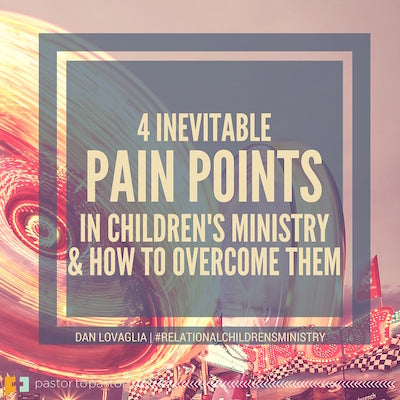Pain Point 1: Fatigued Leaders

The temptation is to start with questions that set a bare minimum: How few leaders can we have and still keep the doors open? Is there a way for us to lower what we expect of those who work with kids? Will children really notice if our only requirement for serving is a pulse? We do this because we are fatigued. And fatigued leaders get this way for a reason. Usually it’s a combination of their choices and the demands placed on them.
Children’s ministries frequently burn out volunteers by not placing them in meaningful roles with clear commitments. The need to fill open positions sometimes trumps pre-qualifications like spiritual gifting, desire, and experience. Or a gifted leader signs on the dotted line, but the ministry does not provide opportunities for him or her to get spiritually recharged along the way. The best children’s ministries pay attention to the fact that the question is not if their leaders will tire, but how they will try to prevent exhaustion and what will they do when it inevitably sets in.
One of my favorite ideas is the concept of “Summer Serve.” By inviting others to serve a few times in children’s ministry outside peak attendance months, it gives school year leaders a break to rest up between ministry seasons and creates a built-in recruiting opportunity for new children’s ministry volunteers.
Pain Point 2: Scarce Budgets
There is a myth that ministries need to be on par with the Magic Kingdom and led by Mickey Mouse or children will stay away.
Don’t forget: kids are drawn to Christ by Christ. That’s more powerful than anything you can buy.
If you are struggling with financial challenges, pray. Then find a way to keep the focus off the budget and back on the children and their families. Financial challenges will always be a reality in ministry. Scarce budgets can be overcome in community with God’s help and by relying upon one another. Your goal isn’t just a cool program with great crafts and games, it’s lifelong discipleship in the lives of kids.
Pain Point 3: Complex Programs
One of the best things I’ve learned through doing children’s ministry over the years is that things work best when you keep them simple. Overly complex programs drain energy from the ministry. Every layer of complexity brings with it additional potential to distract the attention of those serving away from the people they are called to reach, disciple, and serve. Over time, as ministry structures become more and more complex, more and more of your “ministry energy” gets redirected back into keeping the program running and not into the lives of the children.
Simplicity is the goal. The purpose of children’s ministry is never the program itself—it’s bringing glory to God and serving children and their families. So how do you achieve this simplicity? How do you avoid becoming too complex? The setting, values, and culture of a particular church each play an important role in deciding how to go about structuring ministry.
Wrestling between too simple and too complicated will be a constant pain point in every children’s ministry. Learning to contextualize and adapt so the program and the curriculum serve your people—that is the goal.
Pain Point 4: Shallow Content
There is a tension between presenting exciting content (having fun) and introducing kids to engaging truth (connecting the Bible to real life). As kids grow, fun isn’t the driving factor that keeps them rooted in faith. When push comes to shove, they will walk away from the church because discipleship and daily life remain disconnected. When the church family seems irrelevant or unsafe or misguided, children will seek out truth in community elsewhere.
The truth is that there will always be something more exciting than your children’s ministry. That’s not a reason to kill the excitement. But it cannot be your primary (or even secondary) goal. Your goal is engaging children and students with God’s truth.
On the one hand, we don’t want to bore kids. So we must seek to engage interest without being shallow. One of the best ways to do this is by matching biblical truth to personal experience through a meaningful relational environment. We walk with God and one another.
— by Dan Lovaglia, adapted from his new book Relational Children’s Ministry: Turning Kid-Influencers Into Lifelong Disciple Makers. Lovaglia’s book will tell you more about how to overcome these pain points.
How to Use This Book
Do you feel like your children’s ministry just spinning its wheels? This book will help you embrace Jesus’ disruptive approach to discipleship, and rise above the status quo. This is “an essential read for anyone working with children in the church today,” writes Gary Burge.

